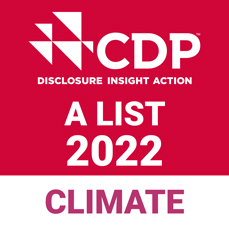DJSI [selected as a component stock in the Asia-Pacific region for the ninth consecutive year]
DJSI is an abbreviation of the Dow Jones Sustainability Indices, a leading global ESG investment index developed by Dow Jones (USA) and RobecoSAM (Switzerland).

FTSE Blossom Japan Sector Relative Index
Created by the global index provider FTSE Russell and designed to be a sector-neutral index that reflects the relative performance of Japanese companies with superior environmental, social and governance (ESG) performance in each sector.

JPX/S&P CAPEX & Human Capital Index
An index developed jointly by the Japan Exchange Group, Inc., Tokyo Stock Exchange, Inc. and S&P Dow Jones Indices that targets companies actively engaged in "capital expenditure and investments in human capital".
Morningstar Japan ex-REIT Gender Diversity Tilt Index (GenDi J)
An index created by the leading U.S. financial services company Morningstar that focuses on companies whose gender diversity policies are embedded in their corporate culture and who are committed to equal opportunities for their employees regardless of gender.

MSCI Japan ESG Select Leaders Index
Created by the leading U.S. financial services company MSCI and composed of the top-ranked Japanese stocks by market capitalization, selected from companies in each industry with relatively superior ESG ratings.

S&P/JPX Carbon Efficient Index
An index developed jointly by S&P Dow Jones Indices and the Japan Exchange Group, Inc. that determines the weight of constituent stocks by focusing on the status of environmental information disclosure and the level of carbon efficiency.

CDP [Scored A for climate change, B- for water]
An international NGO headquartered in the United Kingdom. The evaluation is based on an 8-point scale from A to D- for the company's initiatives and information disclosure in the environmental field, in the three areas of climate change, water resources, and forest protection.

JCR [Consecutive A rating since 2020]
The Japan Credit Rating Agency is one of Japan's leading rating agencies that provides ratings for long-term and short-term credit.

R&I [Consecutive A- rating since 2018]
Rating & Investment Information, Inc. is one of the leading rating agencies in Japan, focusing on major rating business.

Platinum “Kurumin” certification [Acquired in August 2023]
Certified by the Minister of Health, Labour and Welfare as a superior company that has taken an especially high level of initiatives among those certified as a "Child Rearing Support Company".

Health & Productivity Management Outstanding Organization [Acquired in 2023]
A certification system established by the Ministry of Economy, Trade and Industry to promote health and productivity management. A program to highlight corporations, including large enterprises and SMEs, that practice particularly excellent health management based on initiatives that are in line with local health issues and health promotion efforts promoted by the Nippon Kenko Kaigi.

GCCA (Global Cement and Concrete Association)
The organization was founded in 2018 and took over the activities of the Cement Sustainability Initiative of the WBCSD in January 2019. It is composed of approximately 40 of the world's major cement companies and covers 40% of the world's cement production capacity (80% excluding China). Taiheiyo Cement is a founding member and the only Japanese manufacturer to participate in its activities.

INNOVANDI (Global Cement and Concrete Research Network)
INNOVANDI is a research network launched by GCCA in 2020. It conducts research and development such as sustainable concrete and cement and CO2 capture and recovery, and we have participated since its inception.

UNGC (UN Global Compact)
An initiative proposed by the United Nations and signed by more than 21,200 companies and organizations in 160 countries as of 2022. It requires the top management to commit to 10 principles related to the protection of human rights, elimination of unfair labor practices, environmental considerations and preventing corruption.

Industrial Federation for Human Rights, Tokyo
Established in November 1979, the federation now consists of 122 companies, most of which are headquartered in Tokyo. Under its basic philosophy of voluntary management and full participation, the federation endeavors to resolve the “Dowa issue” (discrimination against a caste-like minority of ethnic Japanese) and other human rights issues from a company perspective.
